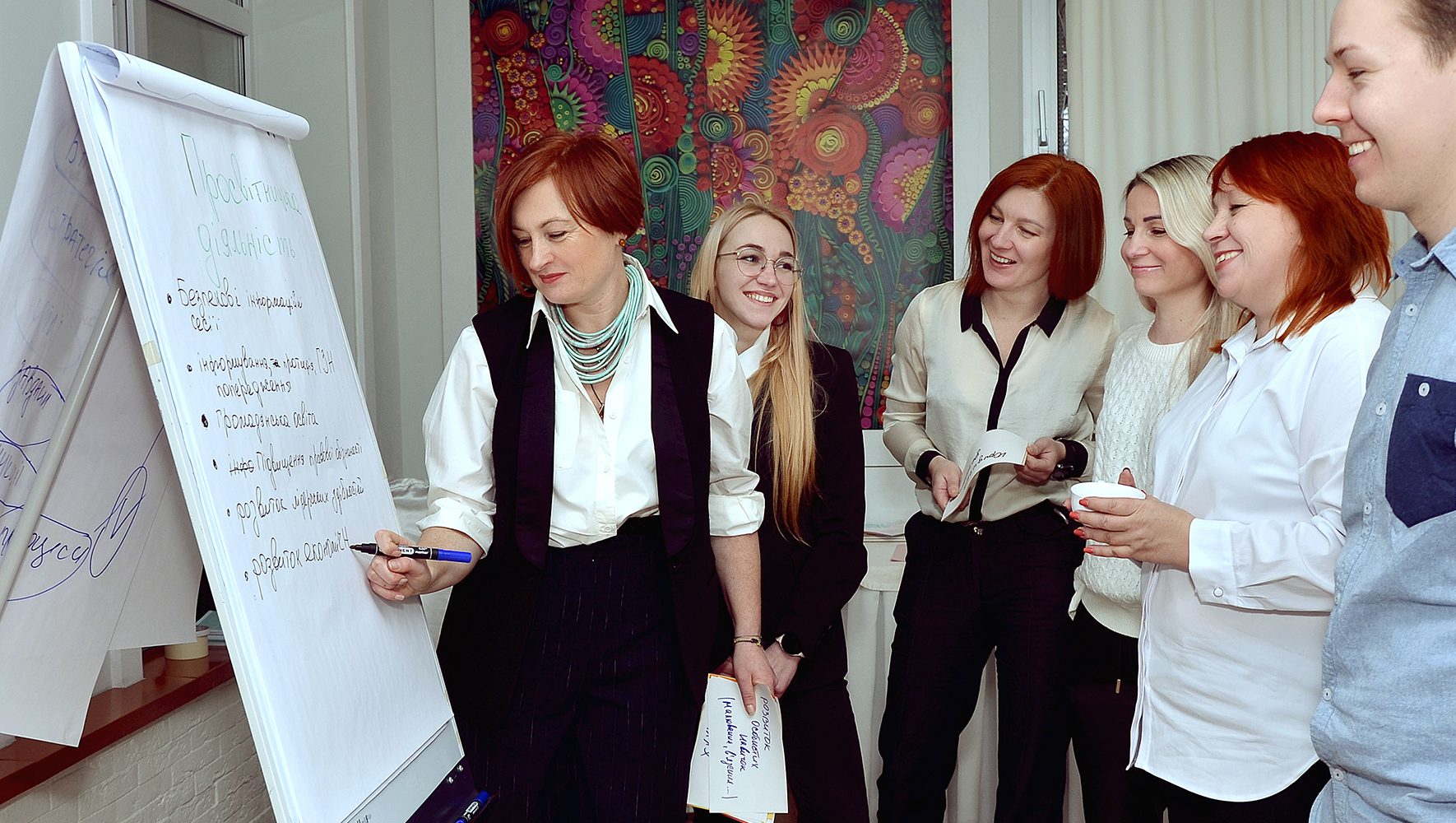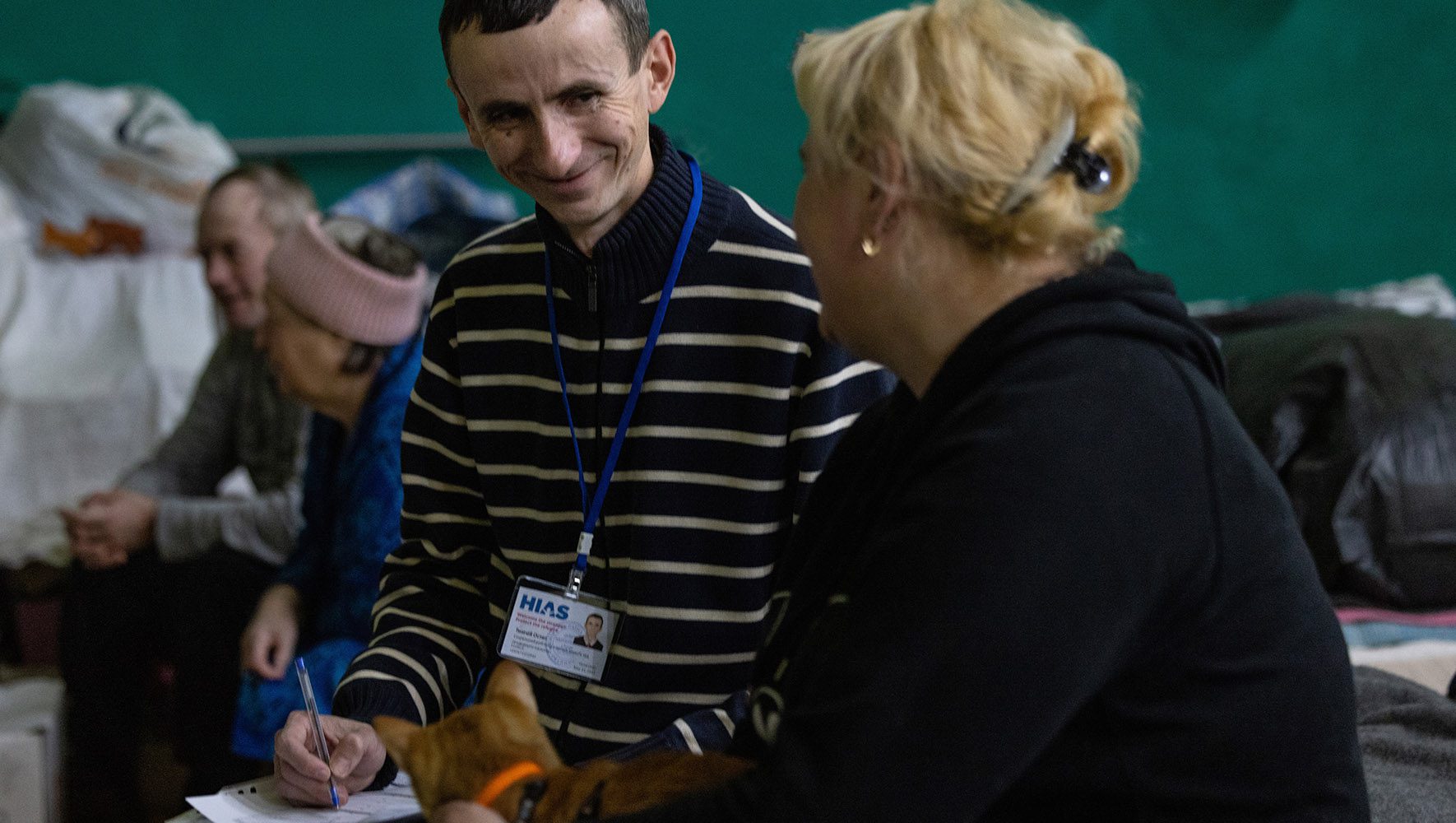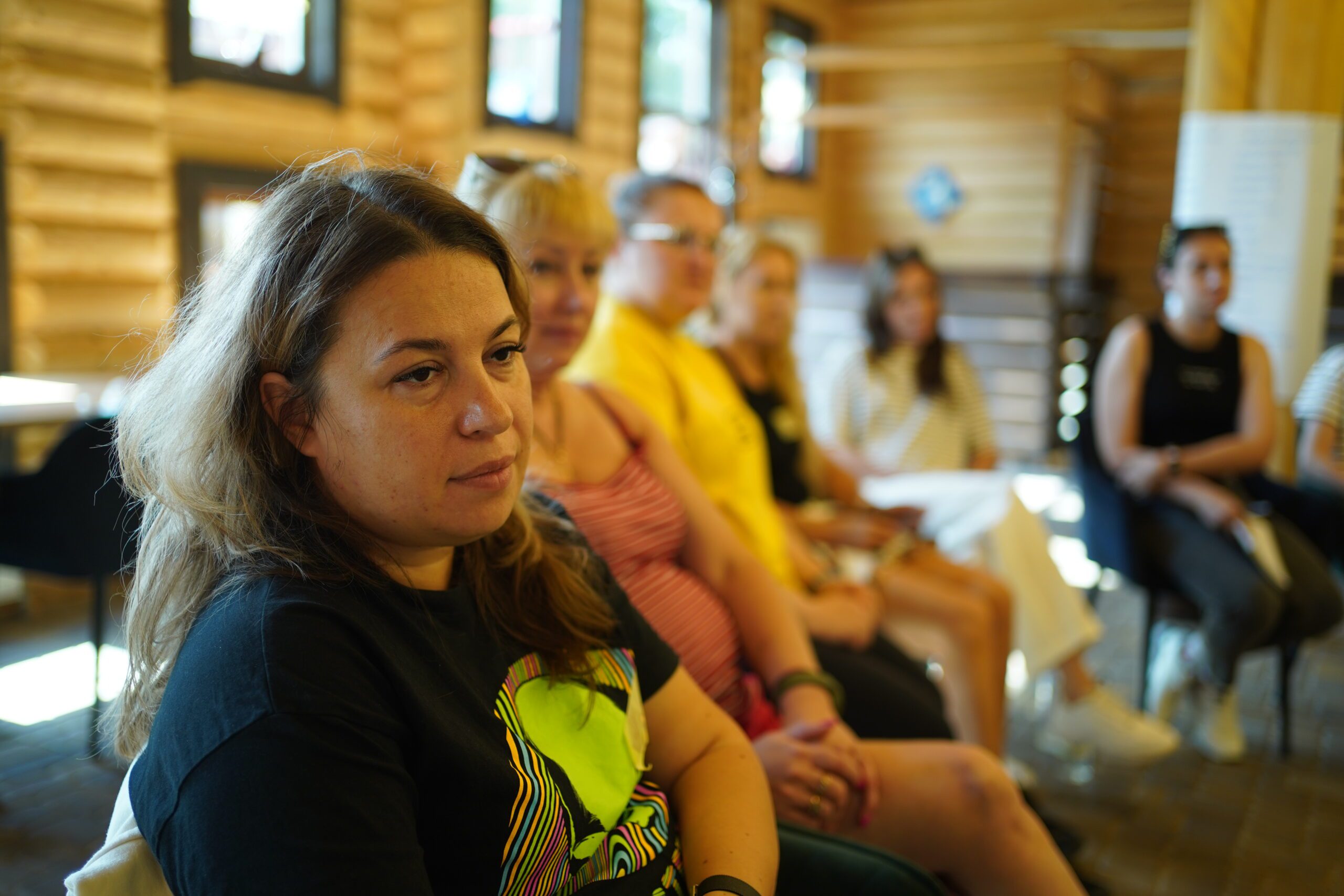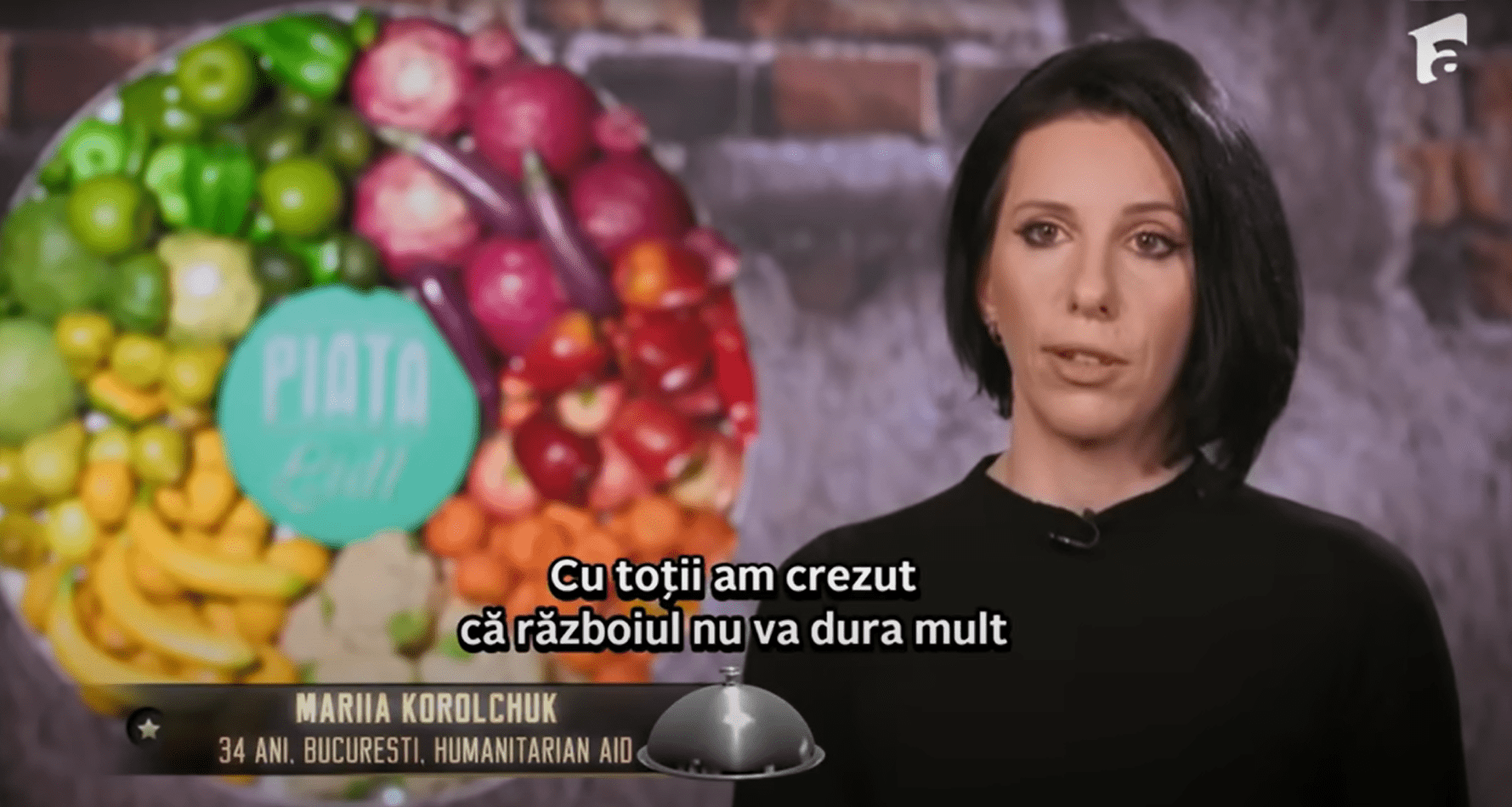
Valentyna Denysenko, (2nd from Right) head of Green-landiya; and Tetiana Chernikova (3rd from L), the organization’s co-founder; participate in discussions at the NGO’s strategic session on December 23, 2023, in Kyiv, Ukraine. (Denys Ivanov/HIAS)
When war reached the village of Novomykhailivka in Ukraine’s Donetsk region on Feb. 24, 2022, Kateryna Merzlikina, her husband, and their two children decided to pack up and flee. They had 30 minutes.
“We did not know where we were going, and we did not have acquaintances we could visit,” she recalled. “We were going into the unknown.”
That April, after months of uncertainty, Merzlikina and her family settled in Novoyavorivsk, a small town in western Ukraine. This provided a measure of security. But Merzlikina, 40, missed what she left behind in her old village, where she ran a youth center. She decided to visit the local center for internally displaced persons (IDPs), where representatives from HIAS encouraged her to return to community organizing.
Merzlikina was looking for people who understood her journey. As it turned out, there were many. In addition to having formal meetings with HIAS staff, she heard other IDPs share about the emotional burden of relocation. The experience not only moved her — it gave her a vocation. Along with two others, Merzlikina created Women Change the World, a non-profit organization that helps IDPs with education, housing, and other programming. Their task is to fill gaps left by local governments.
“Thanks to women from HIAS — their kindness and care — we became more united,” she said.
The fateful connection between Merzlikina and HIAS is one of many such collaborations. After the full-scale war displaced millions throughout Ukraine in 2022, HIAS launched a fund supporting 20 women-led organizations to support the needs of Ukraine’s internally displaced population. The fund forged a connection between HIAS’ sizable capacity and a network of self-starters on the ground who could gauge needs and build trust. Support for the fund is consistent with HIAS’ global commitment to empowering local organizations around the world. As the full-scale war nears its second anniversary, this work has never been more vital.
“We would really like for women to be a part of the leadership in [Ukraine’s] recovery process,” said Maria José Gómez, HIAS Ukraine’s country director. “When we saw that these organizations were doing amazing things with what little money they had, we [decided] to focus on them.”
“When we saw that these organizations were doing amazing things with what little money they had, we [decided] to focus on them.”Maria José Gómez, HIAS Ukraine Country Director
Providing Mental Health Support — While Navigating Struggles of Their Own
Gomez works to help organizations like Women Change the World navigate growing pains as well as train them with tasks like grant applications and management. Eventually, the organization plans to assist displaced Ukrainians in need of mental health support. It’s a subject Women Change the World is well-qualified to address. Like many other Ukrainian grassroots organizations created amid the full-scale invasion, its 18 team members have had to learn how to build a sustainable operation without burning out — no easy task in an environment marked by uncertainty and sparse resources.
These challenges are all too familiar for Valentyna Denysova. The founder of Green-Landiya, an organization providing humanitarian support to vulnerable groups in Kharkiv, Denysova also vividly remembers fleeing her home in the Donetsk region. This was in 2014, when the onset of war forced her to move from her hometown of Horlivka.
“When you move from one place to another, it feels like no one cares about your problems and you have to solve them all on your own,” said Denysova. “Kharkiv residents debunked this stereotype. They helped us a lot with education and friendly advice … All of them were strangers who became family.”
Denysova and her sister registered a non-governmental organization in 2021 to share the warmth they received with vulnerable groups in the city, focusing on children with disabilities. This positioned them well to respond to the outbreak of full-scale invasion the following year, as connections they had fostered over the years helped them quickly respond to overwhelming requests. In 2022, they worked with over 200 families in the city, finding medical devices for kids and providing humanitarian aid.
To respond to the war’s heavy toll on women taking care of these families, Green-Landiya expanded its psychological and social support operation. Financial support from HIAS helped to scale the operations, while guidelines and management support helped the team handle the logistics for projects that ranged from lectures on preventing gender-based violence to supplying hygiene kits to women and girls in de-occupied areas.

Ukraine: Reflections on a Year in a War Zone
Read MoreBringing the Community Together
In addition to projects on helping the vulnerable groups impacted by the war in the Kharkiv region, Green-Landiya also provided food, clothing, and financial support by establishing a direct link between the families in need and HIAS. Like Women Change the World, Green-Landiya also sought to use HIAS’ understanding of the local context to prioritize emotional connections in the community.
“These women need psychological support and a circle of people who understand them,” said Denysova.
Green-Landiya organized events that brought the community together — providing space to discuss topics ranging from gender-based violence to stress about loved ones on the frontlines. At the Saint Nicholas Day celebration this past December, more than 20 women filled up the organization’s office to “throw a holiday for themselves” as children played with social workers nearby. After exchanging gifts, dancing, and singing, the women left the event feeling elated. One attendee described these events “not as a breath of fresh air — but as oxygen masks” to Denysova.
Denysova credits her experience with war in remaining calm and methodical while helping IDPs in 2022. “As everyone panicked, we kept working,” she said.
With no end to the war in sight, both organizations brace for the continued challenges in 2024. Green-Landiya aims to expand professional resources for women, continue work on gender-based violence prevention, and build out a women’s leadership network to keep local authorities accountable.
Merzlikina, for her part, is eager to learn and give back to the new community, knowing the possibility that she can never return home.
“I want to change something,” she said. “I want to be useful because since the beginning of the full-scale invasion … I have been trying to find myself again. And here, I finally did it.”


